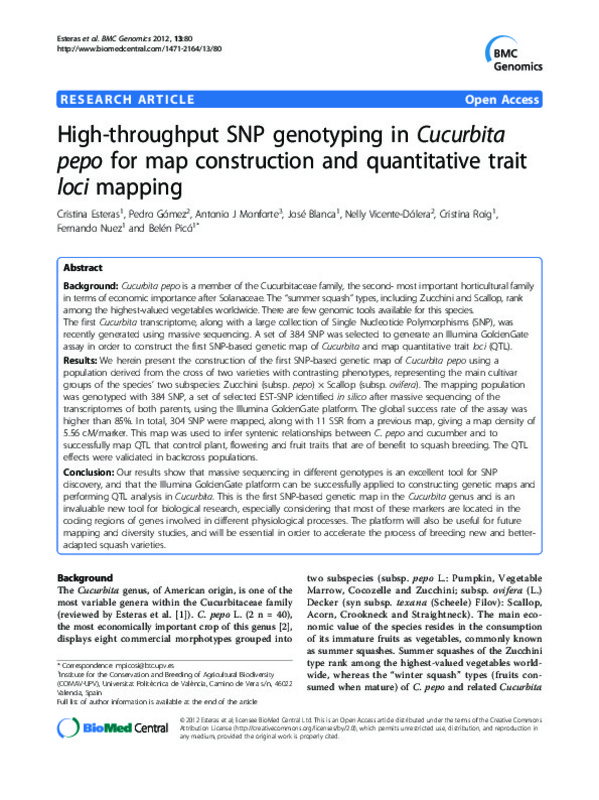|
Resumen:
|
Background: Cucurbita pepo is amember of the Cucurbitaceae family, the second-most important horticultural family in terms of economic importance after Solanaceae. The ¿summer squash¿ types, including Zucchini and Scallop, ...[+]
Background: Cucurbita pepo is amember of the Cucurbitaceae family, the second-most important horticultural family in terms of economic importance after Solanaceae. The ¿summer squash¿ types, including Zucchini and Scallop, rank among the highest-valued vegetables worldwide. There are few genomic tools available for this species.
The first Cucurbita transcriptome, along with a large collection of Single Nucleotide Polymorphisms (SNP), was recently generated using massive sequencing. A set of 384 SNP was selected to generate an Illumina GoldenGate assay in order to construct the first SNP-based genetic map of Cucurbita and map quantitative trait loci (QTL).
Results: We herein present the construction of the first SNP-based genetic map of Cucurbita pepo using a population derived from the cross of two varieties with contrasting phenotypes, representing the main cultivar groups of the species¿ two subspecies: Zucchini (subsp. pepo) ¿ Scallop (subsp. ovifera). The mapping population was genotyped with 384 SNP, a set of selected EST-SNP identified in silico after massive sequencing of the transcriptomes of both parents, using the Illumina GoldenGate platform. The global success rate of the assay was higher than 85%. In total, 304 SNP were mapped, along with 11 SSR from a previous map, giving a map density of 5.56 cM/marker. This map was used to infer syntenic relationships between C. pepo and cucumber and to successfully map QTL that control plant, flowering and fruit traits that are of benefit to squash breeding. The QTL effects were validated in backcross populations.
Conclusion: Our results show that massive sequencing in different genotypes is an excellent tool for SNP discovery, and that the Illumina GoldenGate platform can be successfully applied to constructing genetic maps an performing QTL analysis in Cucurbita. This is the first SNP-based genetic map in the Cucurbita genus and is an invaluable new tool for biological research, especially considering that most of these markers are located in the coding regions of genes involved in different physiological processes. The platform will also be useful for future mapping and diversity studies, and will be essential in order to accelerate the process of breeding new and better adapted squash varieties.
[-]
|
|
Código del Proyecto:
|
info:eu-repo/grantAgreement/MICINN//RTA2008-00035-C02-01/ES/Mejora competitiva del calabacín por características de calidad de fruto y resistencia a enfermedades: Desarrollo de RILs, marcadores codominantes SSR, CAPS y SNP, y construcción de un mapa genético./
info:eu-repo/grantAgreement/MICINN//RTA2011-00044-C02-01/ES/Desarrollo competitivo de nuevos cultivares de calabacín y ampliación de la plataforma genómica para la mejora de esta hortaliza/
info:eu-repo/grantAgreement/MICINN//RTA2011-00044-C02-02/ES/Desarrollo competitivo de nuevos cultivares de calabacín y ampliación de la plataforma genómica para la mejora de esta hortaliza/
|
|
Agradecimientos:
|
This research was funded by the INIA projects RTA2008-00035-C02-01/02 and RTA2011-00044-C02-1/2 of the Spanish Instituto Nacional de Investigacion y Tecnologia Agraria and FEDER funds (EU). The NVD grant was supported by ...[+]
This research was funded by the INIA projects RTA2008-00035-C02-01/02 and RTA2011-00044-C02-1/2 of the Spanish Instituto Nacional de Investigacion y Tecnologia Agraria and FEDER funds (EU). The NVD grant was supported by the Programa de Formacion del Personal Tecnico e Investigador from IFAPA, co-financed with European Social Funds. The authors wish to thank P. Salas and E. Martinez Perez for their technical assistance in the fruit characterization. We are thankful for the kindly suggestions of Dr. Harry Paris for the F<INF>2</INF> C. pepo mapping population.
[-]
|









